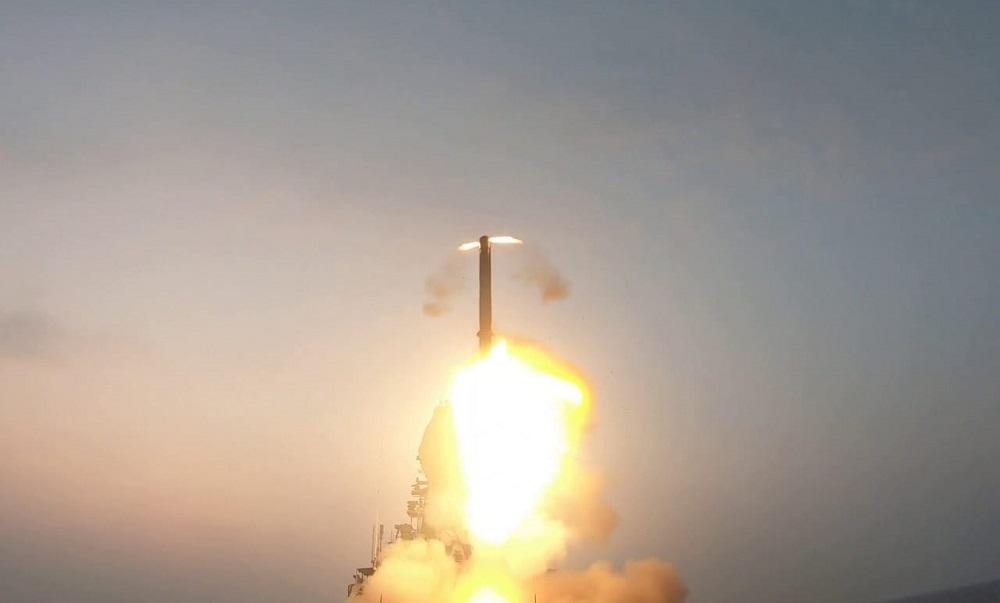Advanced sea to sea variant of BrahMos supersonic cruise missile was tested from INS Visakhapatnam (D66) on January 11, 2021. The supersonic cruise missile hit the designated target ship precisely. The latest missile destroyer Visakhapatnam was delivered to India’s Navy in November last year. The missile destroyer carries 16 BrahMos anti-ship supersonic cruise missiles. The new BrahMos missiles boosted the country’s defense capability to repel threats and raised its military status to the international level.The Brahmos missile has a flight range of up to 290-km with supersonic speed all through the flight, leading to shorter flight time, consequently ensuring lower dispersion of targets, quicker engagement time, and non-interception by any known weapon system in the world.
The BrahMos (designated PJ-10) is a medium-range ramjet supersonic cruise missile that can be launched from submarine, ships, aircraft or land. It is notably one of the fastest supersonic cruise missiles in the world.[15] It is a joint venture between the Russian Federation’s NPO Mashinostroyeniya and India’s Defence Research and Development Organisation (DRDO), who together have formed BrahMos Aerospace. It is based on the Russian P-800 Oniks cruise missile and other similar sea-skimming Russian cruise missile technology. The name BrahMos is a portmanteau formed from the names of two rivers, the Brahmaputra of India and the Moskva of Russia. It is the world’s fastest anti-ship cruise missile currently in operation. The land-launched and ship-launched versions are already in service.

BrahMos surface-to-surface variants was first test-fired on 12 June 2001 from the Integrated Test Range (ITR), Chandipur in a vertical launch configuration. On 14 June 2004, another test was conducted at ITR and BrahMos was fired from a mobile launcher. The new navigation system uses an Indian chip called G3OM (GPS, GLONASS, GAGAN on a Module). The system weighs around 17 grams, and gives accuracy below five metres using Indian, US and Russian navigation satellites. The system can be used in tandem with and Inertial Navigation System (INS) to provide high-accuracy targeting without using any seeker. On 30 September 2020, India successfully test-fired an extended range BrahMos supersonic cruise missile. The supersonic cruise missile is capable of hitting targets at more than 400-km range. The test was carried out under PJ-10 project of the Defence Research and Development Organisation (DRDO), under which the missile was launched with an indigenous booster.
INS Visakhapatnam is the lead ship and the first of the Visakhapatnam-class stealth guided-missile destroyers of the Indian Navy. The destroyer also incorporate a diverse range of equipment from various manufacturers; Russia’s Baltic Shipyard was contracted to supply four Line shafts, while two Zorya M36E gas turbines were procured from Ukraine. The RBU-6000 anti-submarine rocket launchers and the 533 mm torpedo tubes were manufactured by Larsen & Toubro (L&T), the Barak-8 surface-to-air missiles were manufactured by Bharat Electronics Limited (BEL), the 76 mm naval gun was manufactured by Bharat Heavy Electricals Limited (BHEL), while the BrahMos cruise missiles were manufactured by BrahMos Aerospace.
BRAHMOS, the supersonic cruise missile was successfully test fired today on 18th October 2020 from Indian Navy’s indigenously-built stealth destroyer
INS Chennai, hitting a target in the Arabian Sea. The missile hit the target successfully with pin-point accuracy.— DRDO (@DRDO_India) October 18, 2020















